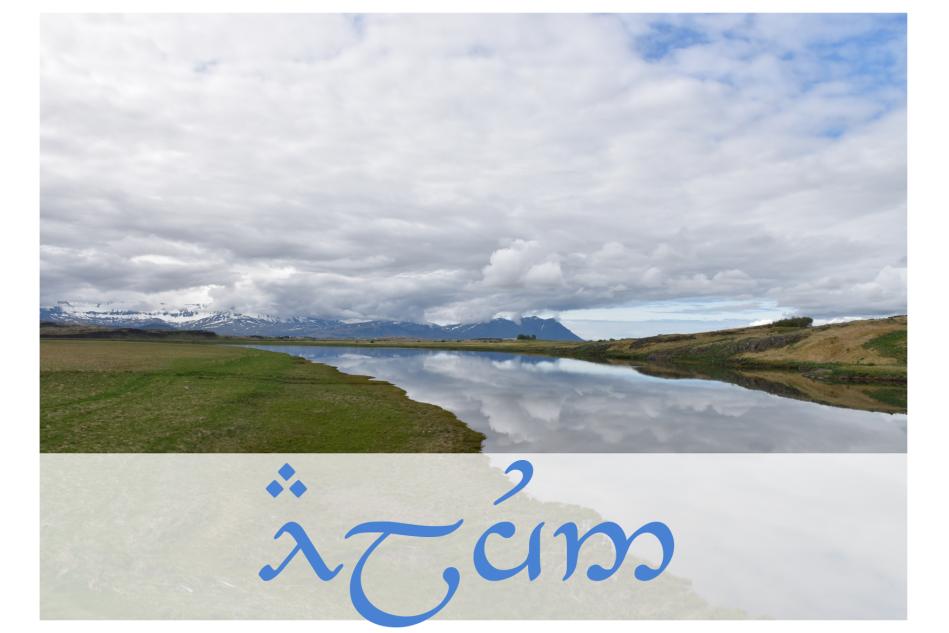Aeluin Revisited by Anérea
Fanwork Notes
Written for this postcard prompt featuring a photograph of Tarn Aeluin and the message
“We say that where there is life, there is hope.
Yet for Men, even death does not put an end to hope.”

Photograph and postcard design by Grundy.
My gratitude to my beta, sallysavestheday for saving my fic!
Fanwork Information
|
Summary: A nonagenarian Andreth thinks back on her life, and love. (Featuring cameo appearances by Finrod and Adanel.) Major Characters: Aegnor, Andreth Major Relationships: Aegnor/Andreth Genre: Romance Challenges: Jubilee, Manwë's Mailbag Rating: General Warnings: This fanwork belongs to the series |
|
| Chapters: 1 | Word Count: 413 |
| Posted on 14 February 2023 | Updated on 16 February 2023 |
|
This fanwork is complete. | |
Aeluin Revisited
This takes place in the mid-fourth century of the First Age, at Tarn Aeluin in Eastern Dorthonion.
Andreth's memories go back, first about sixty or seventy years, and then to F.A.409 when she was about forty-eight and having the conversations with Finrod that make up the Athrabeth Finrod ah Andreth.
(400 words, not sure why it says 413.)
Read Aeluin Revisited
:|:
With the still water reflecting blue sky and soft clouds, the tarn looked nothing like Andreth remembered from that last starlit night they’d shared here, so long ago. Aegnor had looked for her reflection in the dark waters as if afraid to look at her, and when he had suddenly laughed, saying she’d caught a star in her hair, she had noticed that a tear on his cheek had caught its light too.
::
Youthful she had been then — and young still she was to her Elven friends, though her greyed hair and creased skin said otherwise to her own kin. Wise-heart she had later come to be named and, indeed, so wise she had fancied herself, then, when the bitterness clouding her heart had shadowed her inner mind.
Those heartful debates with her cherished friend Finrod — half a lifetime away — about life and love, and death and hope, had raised her ire more than once, the two of them swirling their views around each other, around and around until they could no longer remember whose belief had been whose to begin with.
And yet it was through Finrod’s provocations that her brittle bitterness had softened into deeper insight, with its accompanying gentle acceptance.
But it had taken Adanel’s perception to discern how Finrod’s bewildered and enduring grief at Bëor’s final departure had so distressed his youngest brother as to smother the flame of his ardour. And it was through Adanel’s suasion that Aegnor overcame his self-preserving fear of inevitable and abiding loss — masked as it had been as an inviolable adherence to ancient Elvish custom, devised long ere her kind awakened, never having envisioned their unique bond.
Understanding how great and imperishable a gift their time together was, even — and especially — through the brief but baffling decline of mortal ageing, Aegnor sought Andreth’s company once again, and her forgiveness. And thus their love grew only deeper as the years passed, and they a little wiser.
::
Reflections rippled as a light breeze played over the surface of the water and Aegnor held her a little closer, pulling her back from her memories. Turning to look at him, Andreth saw herself reflected in his eyes, the softly contented smile they contained expressing her own feelings. And in her heart-mind, with a sudden sharp clarity, she felt the truth: that that which bound their fëar in life, would not be broken in death.
:|:
Chapter End Notes
This ficlet references a portion of the “Athrabeth Finrod ah Andreth” from Morgoth's Ring.
Adanel was a wise woman and Andreth's aunt through marriage. Adanel took her in from a young age and passed on much of her people's wisdom to her.
The ancient Elvish custom I refer to is from Finrod telling Andreth “This is time of war, Andreth, and in such days the Elves do not wed or bear child; but prepare for death — or for flight.” It’s from Laws and Customs, which states that “the Eldar would beget children only in days of happiness and peace if they could.” (I have thoughts on this, and plan to eavesdrop on that occasion when Adanel gave Aegnor and Finrod a piece of her mind. I’ll let you know what I hear.)
Typically, Tolkien changed his mind on a number of points of the Athrabeth between the drafts and the final manuscript, and I think it's not only possible but highly likely that Andreth, Aegnor, and Finrod would have too — after all, that is the whole point of engaging in an athrabeth, a debate or interchange of words.
My concept of heart-mind is partly inspired by the beautiful Quenya word órë (Sindarin gûr) which Tolkien translated as “heart (inner mind)” and also described it as “the source of wisdom and moral impulses that informed one’s judgement”, among other things.
Heartful meaning "devout, earnest," is an obsolete word from the mid-14c. that I discovered in the process of writing this ficlet, and immediately fell in love with.


Yes! Aegnor came back! GOOD.
Yes! Aegnor came back! GOOD.
Oh yes
I could have sworn I replied to you!
Yes, the idiot came to his senses, after Adanel gave him a piece of her mind!
Ooh, I love the word…
Ooh, I love the word heartful! What a great word. Enjoyed this ficlet!
Thanks Maggie!
Isn't it a lovely word? I've already used it in conversation!
Beautiful! I loved it so so…
Beautiful! I loved it so so much! Great ficlet!
:)
Thank you!